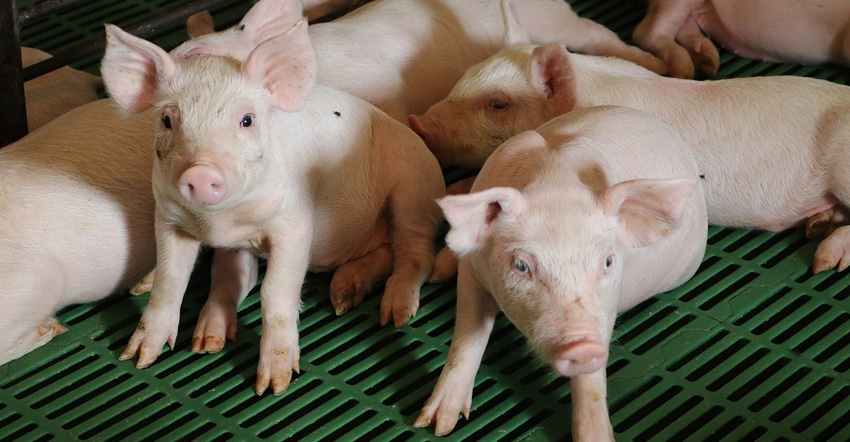Could barley be an option in weaned pig diets?
Previous University of Alberta research replaced dietary wheat with barley in nursery pigs, occasionally increasing feed intake, weight gain and gain-to-feed.

Often used as a source of energy in animal diets, barley contains more protein and lysine than corn and may impact gut health. However, in the swine industry, barley grain is rarely fed in weaned pig diets because of its low energy value and relatively high content of fiber.
"Among cereal grains, barley contains the least amount of net energy, which coincides with a greater content of neutral and acid detergent fiber," says Joaquin Sanchez-Zannatta, swine nutritionist and Ph.D. candidate in the lab of Dr. Ruurd Zijlstra at the Department of Agricultural, Food and Nutritional Science, University of Alberta. Apart from regular barley, hull-less barley is also grown. "It's interesting to point out that acid detergent fiber in hull-less barley is even lower than that of either corn or wheat."
Beyond NDF and ADF it is difficult to classify fiber under functional properties, Sanchez-Zannatta says. Barley contains some beta-glucan and some hull-less barley cultivars with increased amylose (17%) and beta-glucan (10%) are available that contain more fermentable carbohydrates that may stimulate gut health.
In some of the previous studies conducted by the University of Alberta, replacing wheat with barley in diets fed to nursery pigs and showed increases in feed intake (11%), weight gain (12%) and gain-to-feed (5%).
"This shows that barley can not only replace wheat without reducing performance, but somehow it might also improve growth performance," says Sanchez-Zannatta. "However, the question remains whether this increasing growth performance is because of the animal actually depositing more protein or edible pork, or essentially because of an increased gut fill or the size of the organs."
The researchers next hypothesized that feeding diets based on barley grain differing in fermentable carbohydrates or net energy (NE) would not affect growth performance, feces consistency or body composition in weaned pigs.
To test this hypothesis, 40 pigs (8.6 kilograms; one-week post weaning) were fed one of five dietary treatments containing 600 to 708 grams of cereal grain/kg:
Low-fermentable wheat (LFW)
High beta-glucan, hull-less barley (HFBB)
High amylose, hull-less barley (HFAB)
Low-fermentable hulled barley (LFB)
LFB, without added oil, low NE
Diets provided 10.2 and 9.8 MJ/NE kg (9.4 and 9.1 for LFB-LNE) and 1.32 and 1.21 g standardized ileal digestible (SID) lysine/MJ NE (1.43 and 1.31 for LFB-LNE) for phase one (day 0-14) and phase two (day 14-28) respectively.
For day 0-28, average daily feed intake (ADFI), average daily gain (ADG) and gain:feed (G:F) of pigs did not differ among diets formulated to equal NE and SID lysine/NE ratio.
"Overall, when we compare diets that were equal in net energy, we didn't observe any reduction in growth performance when we replaced wheat with barley," says Sanchez-Zannatta. "However, overall, when we compare the low net energy diet versus the other diets, we observed that pigs consuming the high beta-glucan diet had a lower weight gain. This could be due to a lower net energy utilization by these pigs."
Feces consistency and weights of carcass, non-carcass and empty body weight (EBW) did not differ among pigs fed the four regular net energy diets. The EBW (% of live BW) was 2.1% lower for pigs fed HFBB than pigs fed LFB and LFW.
Comparing LFB with LFB-LNE, low dietary NE value did not affect AFDI, ADG and G:F for the entire trial. Feces consistency, carcass, non-carcass and EBW did not differ between pigs fed LFB and LFB-LNE.
Finally, feeding the low versus the regular NE diets reduced feed costs by $65/tonne. "We were not expecting any savings here, but when we replaced wheat with barley, we were able to reduce feed cost by almost 3%," says Sanchez-Zannatta. "And by not adding canola oil to the barley diet, we reduced feed costs by $60. However, because the pigs increased their feed intake by 10%, there were not any savings on feed cost/kg gain."
While barley grain can replace wheat without affecting growth, feces consistency and carcass weight, high dietary fermentable carbohydrates reduced empty BW.
"Also reducing dietary net energy value of whole barley diets also did not affect growth performance or carcass weight," says Sanchez-Zannatta. "Barley could be an option to replace wheat in the diet without affecting growth performance in pigs."
Sanchez-Zannatta was a finalist in the R.O. Ball Young Scientist Grad Student Competition at the 2023 Banff Pork Seminar.
About the Author(s)
You May Also Like





